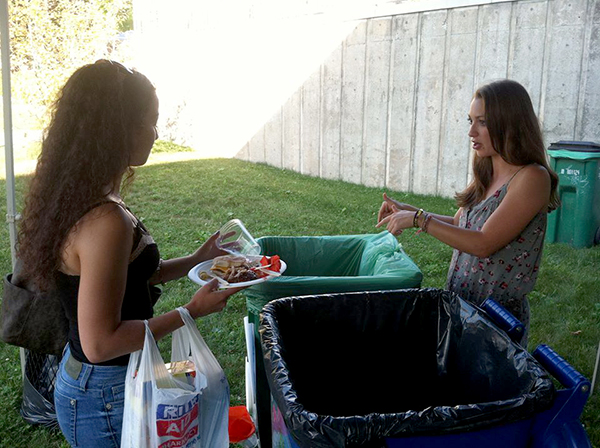

The campus Sustainability Committee kicked off their new composting and recycling program at the RHSA-sponsored BBQ on Aug. 25.
“The zero waste stations at the barbeque were used to educate and expose students to the new changes happening around campus this fall,” Lisa Mitten, the campus sustainability coordinator, said. The new changes will include an assortment of almost entirely compostable and recyclable eating and drinking utensils, available at all Sodexo and CAS locations within the Student Union.
Mitten joined Energy Management Coordinator Brian Pine last May to head SUNY New Paltz’s first Sustainability Office, formed to acknowledge and resolve various campus issues dealing with excess waste.
Mitten and the committee work to limit surpluses of energy use within buildings on campus and push for the purchasing and use of sustainable products.
“We have a unique opportunity working with students in college, to make an impact on such a large number of people,” Mitten said. “We can instill ideas in them that will make the world a better place.”
By educating incoming students on the new cups, napkins, plates, forks, knives and spoons that will soon be used within the SUB, as well as their respective bin for either recycling or composting, Mitten said.
She believes the first step has been taken in decreasing the current amount of waste food services on campus create.
“They learned what is compostable, or able to be broken down, and what needs to be recycled,” Mitten said.
Any items without remains of food and with a low enough recycling number should be recycled. Utensils and plates soiled with food are able to be placed into the compost bin. At the event, seven 35 gallon composting bins were filled to the brim, a testament to how many students were willing to listen, learn, and participate in making the move toward zero waste, Mitten said.
Fourth-year psychology major Shannon Fabiani, who interned for the Sustainability Committee last semester and worked at one of the zero waste stations at the BBQ, agreed
“I spoke for three hours informing students which articles of garbage on their plate go where, including the plate,” Fabiani said. “The reactions were varied, but no one opposed. When you think about it, who is going to resist where their garbage ends up? It is just a matter of becoming aware of it and learning how to properly and sustainably dispose of your garbage.”
Annie Courtens, a second-year sociology major who also interned for the Sustainability Committee said it was a successful step in educating students.
“I wasn’t the only one who thought it was cool that the forks were made from potatoes and other biodegradable material,” Courtens said. “If we all do our part then it can go a long way in making a more healthy and resilient world to live in. We need to give back a little for all that we have taken away from the Earth.”
Fabiani said living in an egocentric society, people forget we are also animals and that Earth’s cycle impacts us, just as we impact it.
An “attachment to disposable culture and little attachment to the earth of our Earth” is what allows us to impact the world so negatively, but education can change this, she said.
“But the education cannot stop here,” Mitten said.
Mitten said further student outreach events will be necessary to drive home the point about the campus’ shift from disposing waste in the trash to recycling and composting of it. Mitten said she also hopes to incorporate signs and information at the recycling and composting bins around campus to further encourage and educate students.
She also seeks to create strong relationships with the residence halls on campus to establish recycling and composting programs within the dorms, as well as working with any clubs or organization that wish to become less wasteful.
